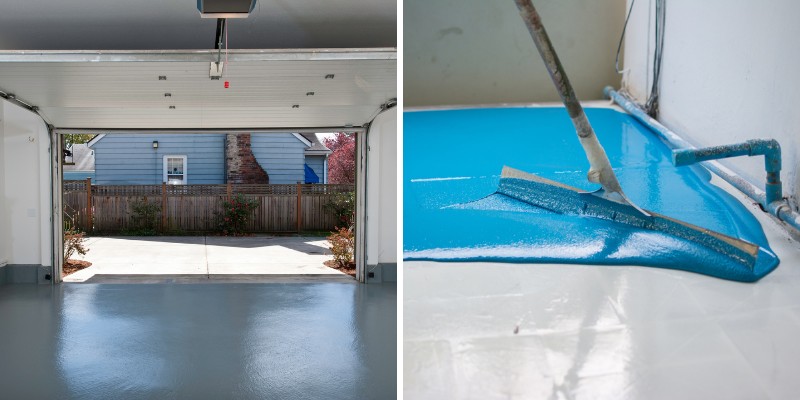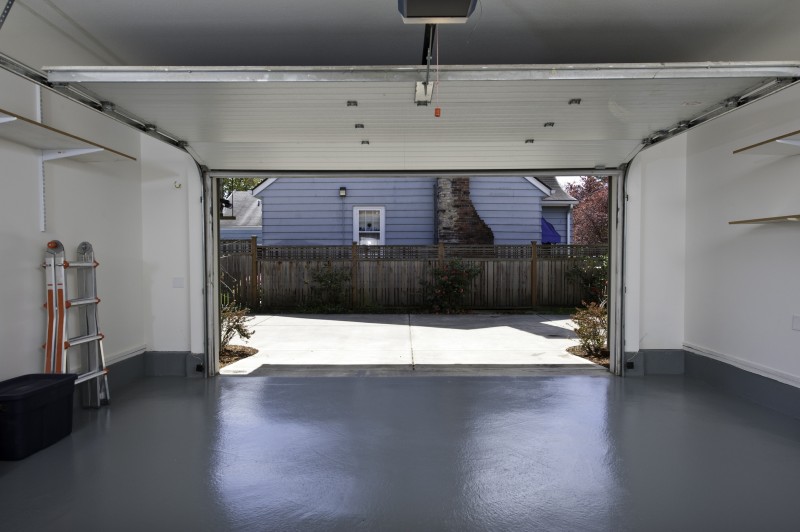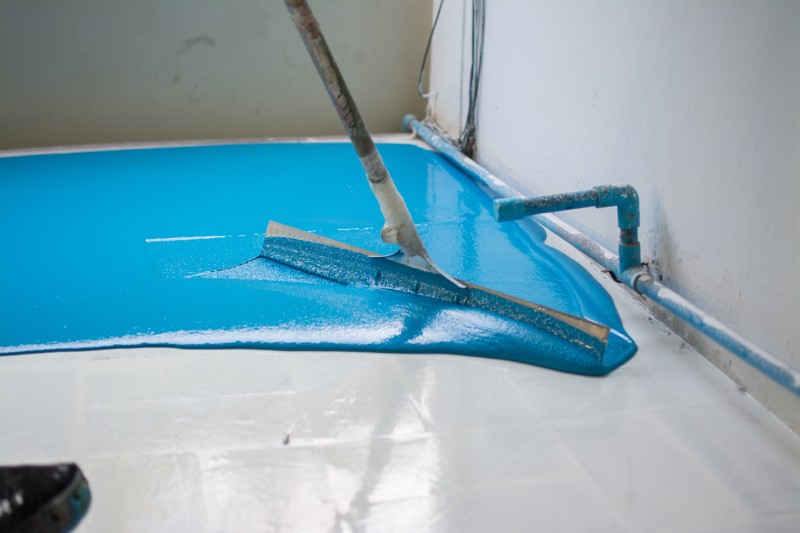If you’re getting ready to apply epoxy coating on your garage floor, it could come as a shock to learn that this popular product was invented in the 1930s by Drs. Pierre Castan of Switzerland and Sylvan Greenlee of the U.S. as a solution for keeping dental devices in place.

The first amber-colored epoxy proved so useful as an adhesive, other industries adapted it and today, more than 50 epoxy resin products are currently for sale on the market – one of which is certain to meet your needs as you set about undertaking your garage floor project.
In this article we’ll discuss the cost to apply epoxy flooring in your garage and various other important aspects you need to consider, so read till the end to get all the details.
What is Epoxy Flooring?
Epoxy is an organic compound that consists of chains of carbon mixed with elements like hydrogen, oxygen, or nitrogen to produce a rigid, highly flexible substance that’s poured over floors to seal and protect them.
This material is allowed to cure via air, heat or chemical processes that complete the chemical reaction needed to seal the surface.
Today’s epoxy products are available in three forms: Water-based, solvent-based, and solid.
All three come with different benefits including epoxy products that fit all household budgets.

How Much Does an Epoxy Garage Floor Cost on Average?
According to both Bob Vila and Home Advisor experts, the cost to do this job in 2021-2022 was estimated to be between $1447 and $3006, thus the average price of this project is about $2227.
Expect to spend between $2 and $5 per square foot for equipment and materials and between $1 and $7 per square foot for labor if you don’t intend to do the work yourself.
Having already learned that no epoxy product on the market is created equal, you’ll want to know that solid epoxy costs three times as much as water-based epoxy, but when it comes to price, water-based versions appeal to folks who love the medium but want to save money.
Factors to consider when calculating project costs
Garage size. Though a one-car garage that’s approximately 250 square feet in size is likely to cost you between $750 and $3000, a two-car garage – averaging 400- to 500-square-feet – is likely to run between $1,200 and $6,000. If you’re trying to cut costs for the larger garage floor, solvent or water-based epoxy can lower the cost.
Labor costs. Not every job goes according to plan, which is why that $1 to $7 per square foot estimate for labor may not be accurate. Your garage floor will need to be prepped for the epoxy application and that could take more time than estimated. Keep in mind the fact that this is a 3-step process: prepping, coating, and sealing.
Application tools. The tools your contractor uses to complete your epoxy garage project can extend the time needed to complete the job. Contractors using rudimentary tools like squeegees, trowels, and sprayers can make the job more labor-intensive which adds to project costs, too. Most concrete floors require acid-washing or etching to prep the floor for epoxy; rollers and power tools get the job done faster.
Materials and equipment. The cost of using solid epoxy is about $1.40 per square foot while water-based products are dramatically cheaper at between $0.37 to $1.20 per square foot. If you don’t own or can’t borrow protective attire and spiked shoes plus rollers, squeegees, hand or power tools, shop vacs and other gear, add rental and purchase costs for these items to your calculations.
Why are epoxy floors so popular?
Once poured, cured, and sealed, epoxy coatings repel harsh chemicals, protect against water damage, heat and materials that would destroy almost every other type of floor covering used to cover garage floors.
Epoxy can be molded for a tight fit and once set, floors can withstand heavy loads, which is why epoxy has become the floor covering of choice for residential garages, commercial docks, warehouses, and repair shops.

Which type of epoxy products is best for your project?
One-component epoxy adhesives are cured at temperatures between 250- and 300-degrees F.
Since one-component products are manufactured without the use of additional catalysts, they cure much faster.
Two-component epoxy adhesives must be cured at lower temperatures and require heat or an infusion of additional materials that accelerate the curing process.
Highly stable, two-component epoxy adhesives are preferred for coating, sealing, and bonding by contractors seeking the product that offers the fastest curing times.
How can you determine whether one is better fit for your job over the other? Ask yourself how much time you have to devote to curing your garage floor and pick one that best meets your time schedule.
3 Types of epoxy you can use for your project
1. Water-based products
These are cheap, thin, easy to apply, low in volatile organic compounds (VOCs), durable and they deliver a nice glossy finish.
These epoxies run between $30 and $50 per gallon, depending upon the store you patronized.
Water-based epoxy needs to be reapplied every 1 to 3 years (based on the amount of abuse your garage floor takes) and only minimally resists chemical spills and minor scratching compared to the other two.
2. Solvent-based epoxy
This is stronger, sturdier, offers better protection from petroleum-based spills and you can apply it even if your project is being undertaken in high humidity or low temperatures.
High in VOCs, flammable, and with average per gallon prices of $45, you or your contractor must wear respirators and take extra safety measures because this type of epoxy is highly toxic.
If you can’t find solvent-based epoxy products on local retailer shelves, they may have been banned by your state.
Currently, 16 states restrict the sale of solvent-based epoxy products. Check this website to see if your state is on this list: https://www.opwdecks.com/voc-states.htm.
3. Solid epoxy
This may be the most expensive option – running between $45 to $150 per gallon — but you can expect to get a lot of bang for your buck.
This durable, robust type of epoxy doubles the thickness of water- and solvent-based formulations, it is environmentally friendly, harder to mar, scratch and damage and does the best job of resisting scratches, heat, and chemical spills. Your solid epoxy floor could remain in great shape for up to 20 years.
What are some advantages of epoxy floors?
- Even the cheapest types of epoxy can last a decade if cared for properly.
- Eco-friendly epoxy products meet “green” standards.
- Epoxy includes additives that increase traction and prevent slip-and-fall accidents.
- It reflects light for increased visibility and safety while working in the garage.
- Smooth epoxy floors won’t damage vehicle tires.
- Cured floors won’t crack and corrode from vehicle weights.
- Protects the floor from spills, leaks and drips, resists stains, too.
- Exceptionally easy to keep clean using a vacuum or broom and mild cleaning solution.
- Road salt left on tires won’t penetrate epoxy coatings.
- Cost-effective, especially when compared to other floor sealing options.
- Epoxy “transforms” the look of concrete so floors are more attractive.
- Hides small flaws by sealing them during the application process.
- Epoxy is available in myriad colors and designs to customize your garage floor.
- Could add to the resale value of a home if you put it on the market.
Is epoxy the perfect floor-sealing product?
This revolutionary type of floor application rarely disappoints, but it’s not perfect for these reasons:
- While it hardens, epoxy “never fully cures” so it could literally keep hardening until it gets brittle.
- Adhesion may be weak, reason enough to seek a warranty from the epoxy manufacturer.
- Color can fade, even if the epoxy floor isn’t exposed to lots of sunlight.
- It could take days more to cure than you expected, upping the cost of the install.
- If garage temperatures get too hot, epoxy residue could soften and stick to car tires.
How long do epoxy garage floors last?
As a rule, the least-expensive epoxy product on the market – even if subjected to heavy traffic and abuse — should last up to 10 years in a residential setting where the garage floor is subjected to normal traffic.
If you use your garage for repairs and other projects, that number could fall to 2 to 3 years. Spend more on a solid epoxy product and the life of your garage floor could be extended to several decades.
How can you make sure your epoxy garage floor has the longest lifespan? Routinely sweep surfaces and maintain the shine using a mild product made for epoxy floors.
Reapply another coating if, in a couple of years, your floor shows signs of deterioration.
No matter which epoxy product you choose to do your job, you’re going to love the way your garage floor looks and behaves once your project is complete.
Resources used
https://epoxy-europe.eu/faq/who-invented-epoxies-and-why/
https://www.hotmelt.com/blogs/blog/adhesive-academy-epoxy-explained
https://www.bobvila.com/articles/epoxy-garage-floor-cost/
https://www.homeadvisor.com/cost/outdoor-living/install-concrete-coating/
https://webfootcc.com/blog/6-reasons-why-you-should-never-use-epoxy-on-your-garage-floor/
https://epoxycolorado.com/2019/08/26/how-long-will-epoxy-floors-last/
Related Posts
- Different Types of Finishes That Make Concrete Floors Aesthetically Appealing
- 10 Main Pros and Cons of Acid Stained Concrete Floors
- 3 Methods to Remove Candle Wax From Your Carpet (With Iron, Hair Dryer, Natural Products)
- 13 Types of Carpets for Your Home (By Material, Pile, Padding)
- What is a Tandem Garage? Description, Pros, Cons, Dimensions etc
- How Much Does it Cost to Build a 24’x24′ two-car Garage?
The article offers a useful breakdown of the factors that influence epoxy garage floor pricing, including square footage, coating type, and preparation work needed. While the cost estimates seem reasonable, actual prices can vary dramatically based on the contractor, materials used, and site conditions. Overall the article provides helpful context on epoxy garage floor costs, but readers would benefit from getting multiple bids before committing to a project.